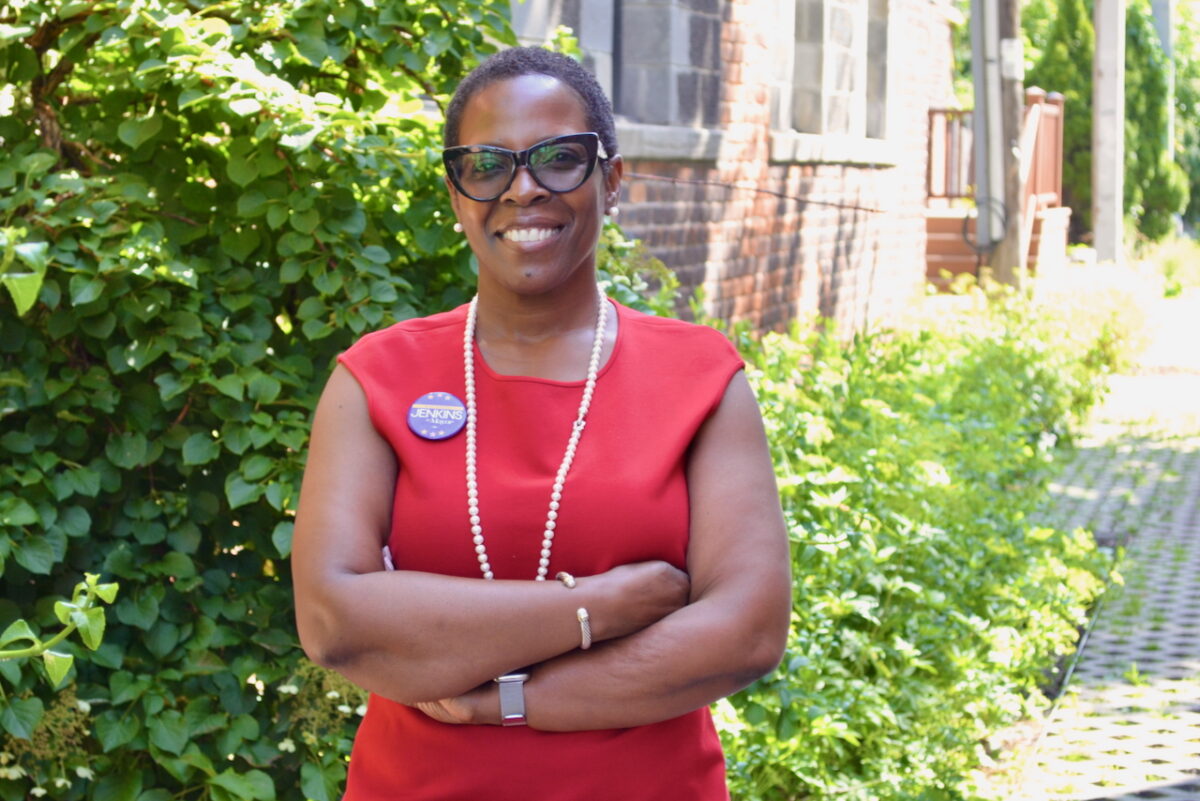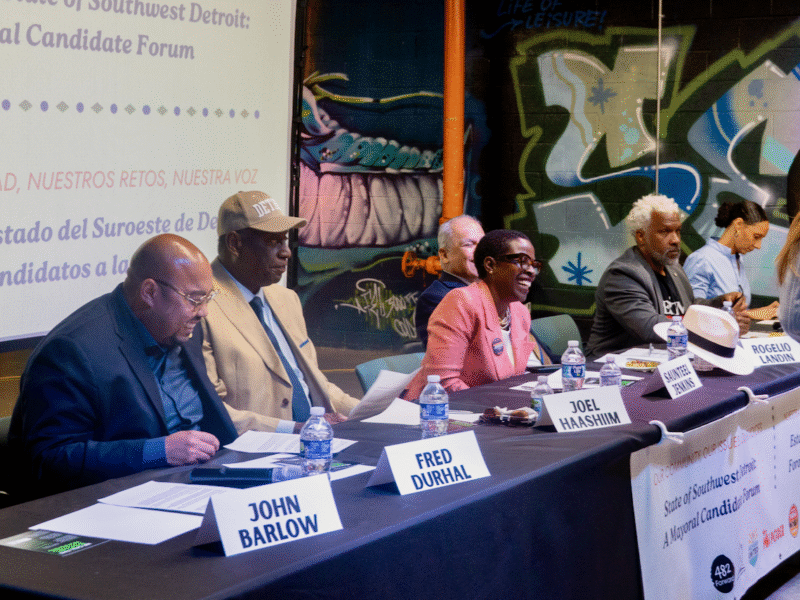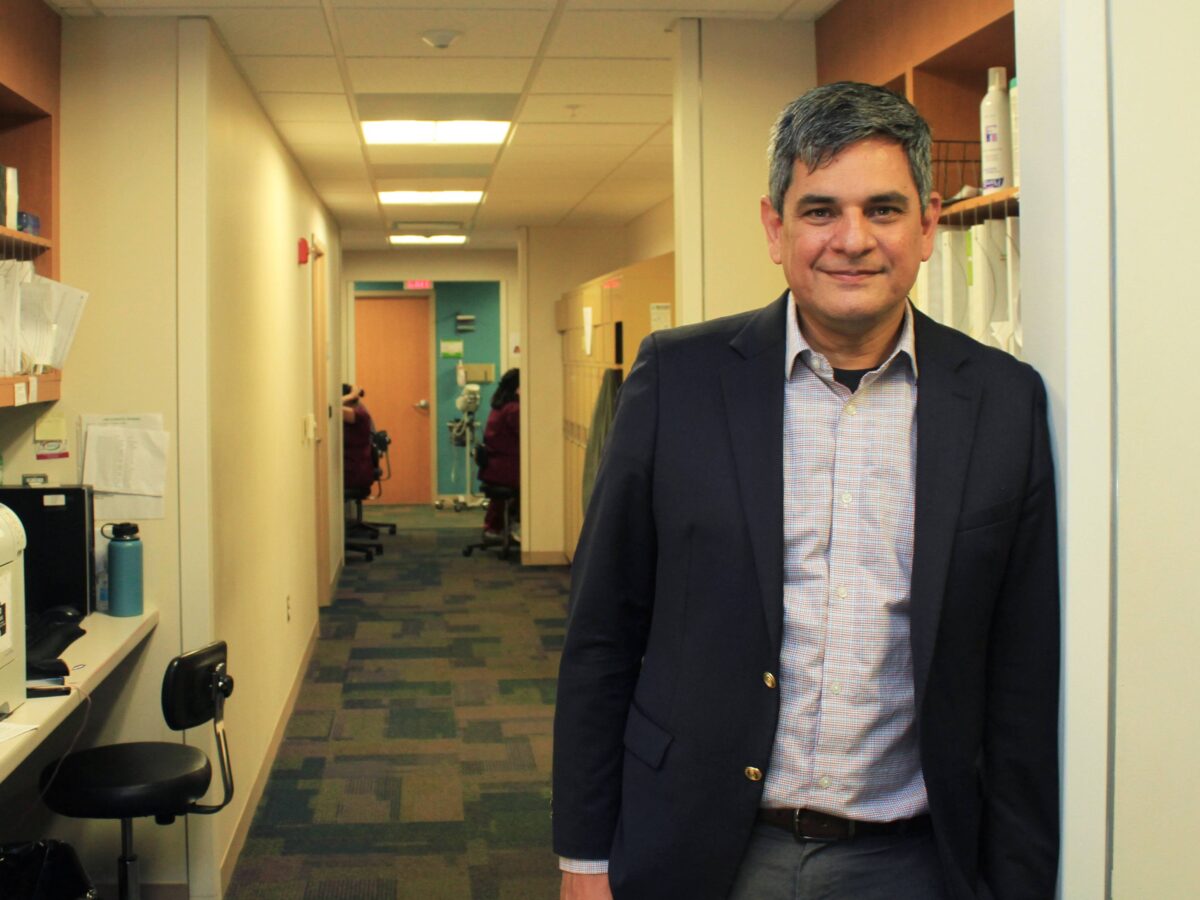Overview:
-Tax incentives can be used as the city's "stick" with developers to ensure environmental mitigation, says Detroit mayoral candidate Saunteel Jenkins.
-Improving Detroit's public transit is part of Jenkins' overall priority of addressing the needs of the most vulnerable Detroiters, she says.
-Jenkins says she's "scared to death" of the local impact that could result from federal cuts to addiction and mental health services.
Saunteel Jenkins, a candidate for mayor in Detroit’s Aug. 5 primary election, spoke with Planet Detroit about environmental and public health issues in the city.
Jenkins is a former member of Detroit City Council from 2010-2014 and served as council president during her last year in office. She has served on the boards of a number of civic organizations.
Most recently, Jenkins was CEO of The Heat & Warmth Fund, and she has also worked as a social worker; as director of the residential treatment center at the Mariners Inn shelter; and as chief of staff to late Detroit City Council President Maryann Mahaffey. She holds bachelor’s and master’s degrees in social work from Wayne State University.
This interview has been edited for clarity and brevity.
How would you balance economic development with environmental impact, for example with a project like the Stellantis plant opened under Mayor Duggan, which created new air pollution issues for east side residents?
Environmental mitigation should have been a required piece of the development agreement for the Stellantis factory, before community benefits discussions, Jenkins said, adding that both the proposed economic benefits and the environmental impact of the project were evident.
“The city should have taken a stronger stance from the very beginning, ensuring that air quality measurements were in place. The tools and the steps needed to ensure the least impact for residents and the community should have been very clear and black and white from the beginning,” she said.
Michigan’s Department of Environment, Great Lakes, and Energy issues environmental permits, Jenkins said — but tax incentives have to be approved by the city, and can be used as leverage for environmental requirements.
“That is the stick, if you will, that the city has,” she said. “It’s basically the only one we have … or the biggest one that we have, and we should utilize it accordingly.”
What role does the city play as the EPA rolls back pollution standards?
The city’s ordinances could be stronger, Jenkins said. She noted the fugitive dust ordinance passed by City Council and the city’s proposed truck traffic ordinance.
“Those should have been in place already, but better late than never,” she said, adding that the ordinances need proper enforcement on the back end.
“What we need to have is an ordinance that sets requirements on the front end of development,” Jenkins said. “We need more housing, we need more jobs — all the things I think we all know. But climate resiliency should be a part of that. Air quality should be a part of that.”
How can the mayor address the issue of utility affordability and shutoffs with DTE Energy and Detroit Water & Sewerage?
Energy efficiency is key for Detroit, which has old houses and a high poverty rate, the former Heat and Warmth Fund CEO said. Families that are not technically in poverty but cannot afford to replace windows or a roof is a “huge issue” as well, she said.
Energy efficiency can be part of community benefits, Jenkins said, giving Stellantis as an example.
“Can community benefits be that you are helping the homeowners in that area to upgrade their homes so that they’re more energy efficient? Maybe they have air filters in the home that could help to mitigate some of those issues being caused by the plants. We have to be more creative about how we help Detroiters make their homes more energy efficient.”
While Jenkins was at THAW, she said the nonprofit helped thousands of families with energy efficiency upgrades, and would make it a priority as mayor to assist vulnerable residents with resources to improve their homes and reduce their utility bills.
Jenkins said she met with Attorney General Dana Nessel, who intervenes in utility rate cases, for policy discussions that led to DTE and Consumers Energy budgeting money for low-income families.
“I was able to utilize those dollars for energy efficiency, for home repairs, for plumbing repairs — to do things that helped make homes healthier for families.”
Less than 50% of those who qualify are able to get utility assistance because the funding runs out every year, Jenkins said.
“It’s a combination of climate, need, and the way every year the state changes the requirements and how families can receive money, and that impacts how quickly the money goes or doesn’t go.”
Starting this fall, more funds from a meter surcharge will be available from the state for vulnerable families, Jenkins said.
Jenkins supports the water affordability legislation introduced in Lansing and would push for a ballot initiative to change the Michigan Constitution so that water rates can be aligned with incomes, she said.
How can the mayor improve Detroit’s public transit?
Improving public transit is a priority for Jenkins, she told Planet Detroit, adding that addressing the needs of Detroit’s most vulnerable residents is an overall priority for her.
“I want to change the culture around public transit in the Motor City. Because we’re the Motor City,” she said, adding that the city has been led to believe that public transit is for when you cannot afford a car.
“Public transit is environmentally friendly, it’s cheaper, it’s safer, and in other cities — many cities that we say we want to be like — public transit is another form of transportation that people often use.”
Jenkins said she supports multimodal transit that includes “block-long buses, but also smaller buses,” that follow shorter routes. The city should use technology for on-demand tracking for service, so it knows when to dispatch an extra bus or shuttle, she said.
“My dream is to have a transit hub in each of the seven districts” that includes scooters, bikes, and buses, where residents can park cars and hop on public transit, she said.
As federal funding cuts impact addiction and mental health services, how would you address and fund public health services?
“I am scared to death of what could happen with the loss of federal funding in a system that’s already severely underfunded,” Jenkins said.
The city must begin with its revenue estimating conference, to know what it has available, and initiate conversations with foundations, philanthropists, and corporate partners “to figure out how we can stand up some of these important services in our community.”
The next mayor needs to immediately start working on the 2026 midterm elections, Jenkins said.
“That is because it’s a federal issue, and the way we can best address it locally is to make sure that we are rallying the troops and helping good people get elected, not just in Detroit — around the state, around the country, utilizing relationships with mayors around the country and federal elected officials to ensure that the midterm elections yield a different result, so that we can stop the bleeding and start to turn the corner.”
The Coordinated Assessment Model — CAM — for homeless services in the city is dysfunctional, Jenkins said: “We need to shut that down and build a new system from scratch, because it’s not working.”
She describes the city’s safety net for people without housing as “woefully inadequate,” and as one that must address issues related to homelessness such as addiction, financial problems, and mental health.
“My vision really is that we are creating a system that accounts for the different types of issues that lead to people being unhoused, one. Two, that we are creating affordable housing for not only the income level, but the stage of life and the style of life that’s needed for people to maintain housing. So if we have people who are homeless because of mental health issues, when we look at housing, it has to include supportive services.”
What is your stance on ICE enforcement in Detroit and the city’s friendliness to immigrants?
“Watching what’s happening with immigrants, in Detroit and across the country, is heartbreaking. It’s inhumane. Detroit has always been a place that is friendly to immigrants. That would not change,” Jenkins said.
If elected, her administration would not utilize Detroit Police Department resources to help ICE detain immigrants or to enforce immigration policy, she said.
“We would work very hard to ensure that Detroit residents … that we’re doing everything we can so that they feel safe in their communities, and we do that by working with nonprofit organizations that they trust.”
Mayors are in a difficult position in scenarios where ICE or the National Guard are sent by the president whether mayors or governors want them or not, Jenkins said, emphasizing the importance of who is elected in the 2026 midterms.
“There are ways that a mayor can certainly help protect immigrants with their stands, their policies, and their actions. Sometimes it’s not the policy as written, it’s the approach to the policy as written,” she said.
“The mayor and the governors across the country can be a first line of defense right up until they are overwhelmed by the federal resources that are used against them, and that’s what we see happening.”
MORE PLANET DETROIT REPORTING
Michigan utility commissioner appointment sparks environmental justice concerns
Whitmer praises new MPSC appointee Shaquila Myers’ work on clean energy legislation, but ratepayer advocates say they fear utilities influenced governor’s decision.
Southwest Detroit mayoral forum highlights public health, immigration
Southwest Detroit residents raise ongoing issues from February’s water main break and health impacts from truck traffic. Candidates promise action to help an area they say has been neglected.
Trump’s Medicaid cuts put estimated 200,000 Michiganders at risk of losing coverage
The passage of Trump’s One Big Beautiful Bill Act poses a threat to the health care of hundreds of thousands of Michiganders with the potential loss of Medicaid coverage and federal funding jeopardizing community health centers like CHASS in Southwest Detroit.
What would your approach be to Detroit’s Office of Sustainability and its funding?
“First it’s a priority: the Office of Sustainability needs to continue. The work needs to continue,” Jenkins said. “But how we fund it? As we sit here, I don’t have a plan, because we need to fully understand how many positions are being funded by ARPA right now,” she said, referring to the federal American Rescue Plan Act, from which the city received $826.7 million.
“What other grant dollars are being used to support the department? What other grant dollars are available, and what city dollars do we have to support the department?”
We’re at the end of a brutal heat wave. Do you have any plans that would address the urban heat island effect or Detroit’s tree canopy?
Jenkins said she’s planted trees with the Greening of Detroit twice in recent months. “I fully support their effort to plant 75,000 trees — I think they’ve gotten close to 30,000 planted thus far,” she said.
“The tree canopies are important, not just in neighborhoods that are already beautiful. We need to make sure that we have trees throughout the city to reduce heat, to help absorb rain water, and we need to have a concerted effort to ensure that some of our most vulnerable neighborhoods are neighborhoods where we’re focused on planting trees.”





